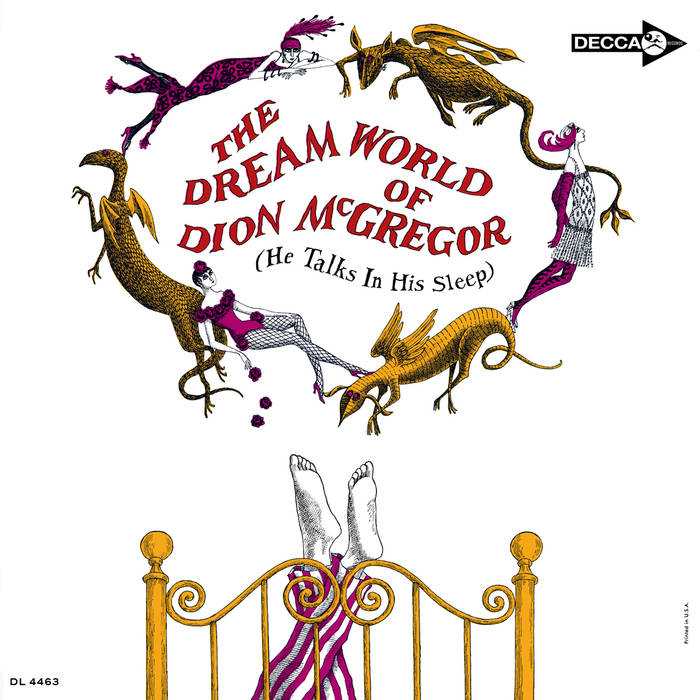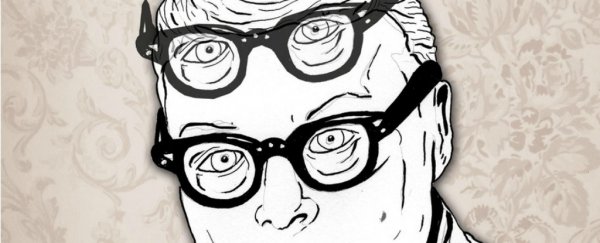Although most of us dream every night, we're usually left clinging to little more than a fading memory the next morning. But Dion McGregor was different. The American songwriter wasn't necessarily better at remembering his dreams than the rest of us, but he was one of the world's most prolific sleep talkers, seemingly able to narrate what his dreams in real-time.
This strange behaviour was recorded almost nightly by fellow songwriter and flatmate Michael Barr, and in the '60s, his sleep ramblings were turned into a cult record, called The Dream World of Dion McGregor. Now, more than 20 years after McGregor's death, scientists at Harvard Medical School think the recordings might help them solve one of the biggest mysteries of sleep research - why we sleep talk, and whether it has anything to do with our dreams.
"It's such a treasure trove of recordings - unlike anything that existed before," lead researcher Deirdre Barrett told David Robson over at BBC Future.
Up to 5 percent of adults regularly talk in their sleep, but usually our ramblings - known as somniloquy - are little more than a few mumbled sentences, and scientists have struggled to work out how, or even if, they match up to our dreams.
McGregor's sleep talking, on the other hand, was detailed and narrative, and appeared to describe dreams that were happening in real-time.
You can hear some of his ramblings about a poisoned eclair being spun around on a Lazy Susan below (and plenty more over on his MySpace page):
Right about now, you're probably wondering how we know that McGregor wasn't faking it, and the truth is, it's impossible to prove he wasn't, seeing as he passed away in 1994. But there are clear reasons that researchers think the sleep talking was genuine.
For starters, when his LP was released in 1964, Random House also decided to publish a book on his sleep ramblings, and to make sure he was legit, they had a psychiatrist examine him. As far as the doctor could tell, McGregor was sane, and not faking the recordings, as BBC Future reports.
Barrett also thinks it would be a pretty elaborate hoax to play - especially considering McGregor was embarrassed about his ability, admitting in one interview: "It's like being famous for wetting your bed."
"If you had to pull a scam it would seem an unlikely one," said Barrett. "I don't think they even expected to make a lot of money from it."
So assuming McGregor's sleep recordings are the real deal, what can researchers learn from them?
By analysing 294 of McGregor's somniloquies with the content and 'bizareness' of other mens' dreams, Barrett aimed to establish once and for all whether he really was narrating his dreams, or whether his sleep talking was part of a different sleep stage.
Surprisingly, compared with average dreams, McGregor's sleep talking was less bizarre, with fewer plot contradictions and inconsistencies. His somniloquies also contained less aggressions, friendliness, and sex than regular dreams, but more self-negativity and female characters than the dreams of other men.
For example, content like this is pretty out there, but actually follows a pretty clear storyline, unlike most people's dreams:
"Oh, that doesn't complete my collection at all! No! Oh no! Well let's see, I have a dodo, and a rock, and a phoenix … oh dear! A pterodactyl, yes, the unicorn, the griffin, dear, oh yes, well a mermaid doesn't count, she's out in the pool! No … well, if she ever gets out I'm gonna mate her with the centaur! Yes! What do you think?! Certainly! Well, I don't know. What do you think? Well, if you don't mate them you know they'll die off!"
Barrett has concluded that there are two possible explanations for the surprising 'normalness' of McGregor's sleeptalking. The first is that his somniloquies weren't actually produced while he was dreaming, and were instead "the production of an unusual state midway between waking and sleeping".
 Artwork from The Dream World of Dion McGregor. Credit: Tzadik and Torpor Vigil Records
Artwork from The Dream World of Dion McGregor. Credit: Tzadik and Torpor Vigil Records
This hypothesis is supported by the fact that past research has shown that our brain waves are different when we're sleep talking and when we're dreaming, with fewer alpha waves occurring during sleep talking. This could be an example of more frontal brain activity, and suggests the brain is slightly more 'awake'.
In fact, in one interview, McGregor said sleep researcher recorded his brain activity and found a mix of sleep and waking brain wave patterns occurred while he was sleep talking, Christian Jarrett reports for the British Psychological Society's blog. However, there's no solid evidence of these experiments talking place.
The second explanation for McGregor's recordings not matching up the other men's dreams is simply the fact that he was a unique character.
"They belong to this distinctive man - a smart, funny, gay professional in the entertainment industry," Barrett concludes in an paper published last year in Imagination, Cognition and Personality. "It is impossible to know which differences are due to which of these two factors, but some appear likelier related to one versus the other."
Barrett now wants to further untangle the mechanism behind McGregor's sleep talking by comparing it to recordings collected by a sleep talking phone app, which could reveal if it's simply unusual when compared to dream content, or whether it's distinct from other people's sleep ramblings as well.
While may never quite understand why McGregor was such an extreme sleep talker, or what it all meant, his recordings will hopefully help us better understand the rest of our crazy night-time ramblings. And for that, we thank him.
